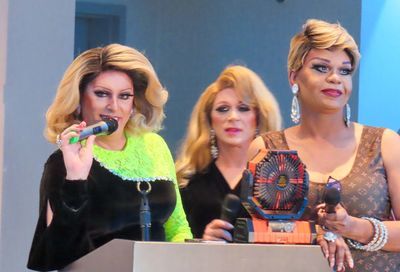Supreme Court sends discrimination lawsuit against anti-gay Oregon bakery back to lower court
Oregon Court of Appeals to reconsider case and whether its earlier decision was influenced by anti-religious bias

The U.S. Supreme Court has ruled that the Oregon Court of Appeals must revisit its earlier decision finding that the owners of a bakery violated Oregon’s nondiscrimination law when they refused to bake a wedding cake for a lesbian couple.
On Monday, the Supreme Court asked the Oregon Court of Appeals to look at the rationale behind its ruling and determine whether it gave enough deference to the religious beliefs of Melissa and Aaron Klein, owners of the Gresham-based bakery Sweet Cakes by Melissa.
The Kleins argued that being forced to bake a cake for a same-sex wedding would violate their religious beliefs opposing homosexuality and same-sex marriage.
The high court’s ruling in the case is consistent with its 2018 ruling in Masterpiece Cakeshop v. Colorado Civil Rights Commission, in which it determined that the Colorado Civil Rights Commission had allowed anti-religious bias to influence its decision finding that Masterpiece Cakeshop owner Jack Phillips violated Colorado’s nondiscrimination law by refusing to bake a cake for a gay couple.
The Supreme Court has since remanded other cases involving LGBTQ people’s ability to access public accommodations to lower courts asking them to ensure that anti-religious bias did not influence their decision-making.
Earlier this month, the Washington Supreme Court reconsidered an earlier decision and found, once again, that a florist violated the law when she refused to provide flowers to a gay couple for their wedding day.
In the case out of Oregon, Laurel and Rachel Bowman-Cryer, a couple of 10 years, went to Sweet Cakes by Melissa seeking a wedding cake.
But when Aaron Klein found out that the wedding was for a lesbian couple, he said, “We don’t do same-sex weddings,” and called the couple an “abomination,” citing Bible verses.
The Bowman-Cryers filed complaints alleging discrimination with the Oregon Bureau of Labor and Industries and Department of Justice.
The Kleins then mounted a public defense of their refusal to serve the Bowman-Cryers, essentially “doxxing” them in the process by sharing private information about them, including their address.
The Bowman-Cryers were inundated with so many hateful messages and death threats that their two foster children had to be removed from the home for their own protection.
The Bureau of Labor and Industries found that the Kleins had violated the Oregon Public Accommodations Law and ordered them to pay financial restitution to the Bowman-Cryers.
The Kleins appealed the decision, and the Oregon Court of Appeals upheld the Bureau of Labor and Industries’ decision.
First Liberty Institute, representing the Kleins, asked the Oregon Supreme Court to review the case, a request it rejected, prompting them to ask the U.S. Supreme Court to intervene.
“This is a victory for Aaron and Melissa Klein and for religious liberty for all Americans,” said Kelly Shackelford, First Liberty’s president, CEO and chief counsel. “The Constitution protects speech, popular or not, from condemnation by the government. The message from the court is clear, government hostility toward religious Americans will not be tolerated.”
LGBTQ advocates criticized the U.S. Supreme Court, accusing it of “punting” the case back to the Oregon Court of Appeals.
“It is very disappointing that the U.S. Supreme Court did not simply deny the discriminating baker’s request for more review,” Jennifer Pizer, senior counsel and law and policy director at Lambda Legal, said in a statement. “It is a longstanding legal rule that the freedom of religion is not a license for businesses to discriminate, and this is one more case about a wedding cake in which an anti-gay business owner is trying to use religious beliefs to excuse denying commercial services to a lesbian couple.
“Just as the Washington Supreme Court did earlier this month in the Arlene’s Flowers case, the Oregon Court of Appeals ruled correctly that businesses violate Oregon law when they refuse to serve LGBT families,” added Pizer. “We are confident that, just as in Arlene’s Flowers, now that the U.S. Supreme Court has sent the case back to the state court for a second look, the Oregon court will again confirm that this discrimination case has been handled fairly and justly, precisely as Oregon law and the U.S. Constitution require.”
Pizer also argued that the issue is not about artistic expression, baking cakes, or religious freedom, but the harms and humiliation that LGBTQ people are subjected to when they are denied access to public accommodations.
“No one should ever experience what we went through when planning what should be one of life’s more joyous moments,” Rachel Bowman-Cryer said in a statement. “To be called an ‘abomination’ because of who you are and who you love, and now always to be afraid that the next store we go into will reject us with the same contempt and discrimination — that’s the legacy of our treatment by the Kleins.
“We are disappointed that the Supreme Court did not wrap this up once and for all, but we are hopeful that courts that understood how stigmatizing that illegal treatment is and how it harmed our entire family will reconfirm their earlier decision.”
Support Metro Weekly’s Journalism
These are challenging times for news organizations. And yet it’s crucial we stay active and provide vital resources and information to both our local readers and the world. So won’t you please take a moment and consider supporting Metro Weekly with a membership? For as little as $5 a month, you can help ensure Metro Weekly magazine and MetroWeekly.com remain free, viable resources as we provide the best, most diverse, culturally-resonant LGBTQ coverage in both the D.C. region and around the world. Memberships come with exclusive perks and discounts, your own personal digital delivery of each week’s magazine (and an archive), access to our Member's Lounge when it launches this fall, and exclusive members-only items like Metro Weekly Membership Mugs and Tote Bags! Check out all our membership levels here and please join us today!





















You must be logged in to post a comment.